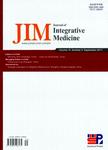SimTCM: A human patient simulator with application to diagnostic accuracy studies of Chinese medicine
SimTCM: A human patient simulator with application to diagnostic accuracy studies of Chinese medicine作者机构:Postgraduation Program in Rehabilitation Science Augusto Motta University Center Program of Scientific Computing
出 版 物:《Journal of Integrative Medicine》 (结合医学学报(英文版))
年 卷 期:2015年第13卷第1期
页 面:9-19页
核心收录:
学科分类:1006[医学-中西医结合] 100602[医学-中西医结合临床] 10[医学]
主 题:medicine, Chinese traditional evidence-based medicine computer-assisted decision making rehabilitation medicine (TCM)
摘 要:OBJECTIVE: The aim of this work is to develop and implement the SimTCM, an advanced computationa model that incorporates relevant aspects from traditional Chinese medicine (TCM) theory as well as advanced statistical and epidemiological techniques for simulation and analysis of human patients. METHODS: SimTCM presents five major attributes for simulation: representation of true and false profiles for any single pattern; variable count of manifestations for each manifestation profile; empirical distributions of patterns and manifestations in a disease-specific population; incorporation of uncertainty in clinical data; and the combination of the four examinations. The proposed model is strengthened by following international standards for reporting diagnostic accuracy studies, and incorporates these standards in its treatment of study population, sample size calculation, data collection of manifestation profiles, exclusion criteria and missing data handling, reference standards, randomization and blinding and test reproducibility. RESULTS: Simulations using data from patients diagnosed with hypertension and post-stroke sensory- motor impairments yielded no significant differences between expected and simulated frequencies of patterns (P = 0.22 or higher). Time for convergence of simulations varied from 9.90 s (9.80, 10.27) to 28.31 s (26.33, 29.52). The ratio iteration profile necessary for convergence varied between 1:1 and 5:1. CONCLUSION: This model is directly connected to forthcoming models in a large project to design and implement the Suite TCM: ProntTCM, SciTCM, DiagTCM, StudentTCM, Research TCM, HerbsTCM, AcuTCM, and DataTCM. It is expected that the continuity of the SuiteTCM project enhances the evidence-based practice of Chinese medicine.



